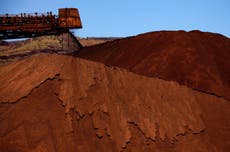Women working at Australia’s Antarctica camps were sexually harassed, report finds
‘Women have to work in the field with their abusers for weeks at a time’
Your support helps us to tell the story
From reproductive rights to climate change to Big Tech, The Independent is on the ground when the story is developing. Whether it's investigating the financials of Elon Musk's pro-Trump PAC or producing our latest documentary, 'The A Word', which shines a light on the American women fighting for reproductive rights, we know how important it is to parse out the facts from the messaging.
At such a critical moment in US history, we need reporters on the ground. Your donation allows us to keep sending journalists to speak to both sides of the story.
The Independent is trusted by Americans across the entire political spectrum. And unlike many other quality news outlets, we choose not to lock Americans out of our reporting and analysis with paywalls. We believe quality journalism should be available to everyone, paid for by those who can afford it.
Your support makes all the difference.Australian women working at research stations in Antarctica have endured a widespread and predatory culture of sexual harassment in the male-dominated field, a new report has found.
Women experienced sexual harassment in the form of requests for sex, uninvited touching, displays of offensive or pornographic material and sex-based insults, according to the report, based on the external review of culture at Antarctic research stations.
The women also described “a homophobic culture” on stations.
Some women claimed they felt compelled to hide their menstruation while on field missions because of the fear of being judged as incompetent by their male counterparts.
They were also forced to ration menstrual products such as tampons and at times improvise due to lack of availability, revealed the report, commissioned by the Australian Antarctic Division (AAD).
The AAD runs four permanent research stations akin to “small towns” in Antarctica and the sub-Antarctic.
Meredith Nash, who wrote the report, said some women feel unsafe at the Antarctic stations and it would be unethical to continue sending women until their safety can be assured.
“Women have to work in the field with their abusers for weeks at a time because they simply can’t leave,” Ms Nash told the Australian Broadcasting Corp (ABC).
The Nash inquiry was initiated after several women raised harassment complaints.
Australia’s environment minister Tanya Plibersek said she was “gobsmacked” by the findings of the report. “As a minister, I take a zero-tolerance response to sexual harassment in any workplace I am responsible for,” she said.
“I have been very clear with the department. We need to make sure that every person working either at head office or in the Antarctic feels safe and if they make a complaint, they can make that complaint without any fear of victimisation,” she told ABC.
“I hope the report will be a catalyst for further change.”
Following the damning findings, Kim Ellis, the director of AAD, said in a statement to staff members that the behaviours needed to improve and urged people to report concerns.
“I am deeply concerned by the experiences it describes at our workplaces where people have been sexually harassed, discriminated against and excluded,” Mr Ellis said.
“It doesn’t matter how many people may have experienced this behaviour – we know that under-reporting is almost certainly a factor – the fact that anyone at all experiences this treatment is not OK,” he added.




Join our commenting forum
Join thought-provoking conversations, follow other Independent readers and see their replies
Comments